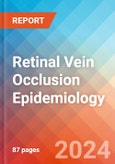Retinal vein occlusion Understanding
Retinal vein occlusion is the term for thrombus-induced blockage of the retinal venous system, which can affect the branch, hemi-central, or central retinal veins. The most frequent cause of the condition is compression of the retina by nearby atherosclerotic retinal arteries. External compression or diseases of the venous wall, such as vasculitis, are other potential reasons. One of the most common retinal vascular illnesses affecting the elderly is retinal vein occlusion, which primarily affects people over 65. Age is the primary risk factor for retinal vein occlusion.The main symptom of retinal vein occlusion is an abrupt alteration in vision. It could involve hazy vision or a total or partial loss of eyesight. Persistent swelling and bruises at the macula, the center of the retina, are the primary cause of irreversible central vision loss. Fluid leakage from broken blood vessels is the source of the edema. Typically, the visual problems are limited to one eye.
Retinal vein occlusion comes in two types: branch retinal vein occlusion (BRVO), which is the obstruction of a minor branch vein, and central retinal vein occlusion (CRVO), which is the blockage of the main retinal vein. This kind is more typical.
Retinal vein occlusion Diagnosis
All pertinent elements of the thorough adult medical eye evaluation are included in the initial examination of a patient with retinal vein occlusion, with special emphasis on those elements pertaining to retinal vascular disease. Fluorescein angiography (FA) and optical coherence tomography (OCT) are two of the methods used to diagnose retinal vein occlusion. Aside from this, individuals with CRVO frequently undergo systemic evaluation, which is guided by the patient's age, comorbid risk factors, and medical background...
Retinal vein occlusion Epidemiology Perspective
The disease epidemiology covered in the report provides historical as well as forecasted epidemiology segmented by the total prevalent cases of retinal vein occlusion, total diagnosed prevalent cases of retinal vein occlusion, gender-specific diagnosed prevalent cases of retinal vein occlusion, age-specific diagnosed prevalent cases of retinal vein occlusion and type-specific diagnosed prevalent cases of retinal vein occlusion in the 7MM covering the United States, EU4 (Germany, France, Italy, and Spain) and the United Kingdom, and Japan from 2020 to 2034.Retinal vein occlusion Detailed Epidemiology Segmentation
- In 2022, the total prevalent cases of retinal vein occlusion in the 7MM were nearly 2,718,067 cases. These cases are expected to increase during the study period
- There were approximately 935,343 diagnosed prevalent cases of retinal vein occlusion in the US. These cases are expected to increase during the study period.
- In the 7MM, the total gender-specific diagnosed prevalent cases of retinal vein occlusion was more in females than males, in 2022.
- In 2022, among EU4 and the UK, the total age-specific diagnosed prevalent retinal vein occlusion cases in the age groups < 65 years, 65-74 years, and =75 years, were observed to be approximately 99,651, 167,093, and 141,342, respectively.
- According to estimates in 2022, Japan accounted for nearly 358,463 prevalent cases of retinal vein occlusion. These cases are expected to increase during the study period.
- The total diagnosed retinal vein occlusion cases in Japan were classified as central retinal vein occlusion branch retinal vein occlusion, with nearly 39,620 and 139,612 cases, respectively, in 2022.
Scope of the Report
- The report covers a descriptive overview of retinal vein occlusion, explaining its symptoms, pathophysiology, and various diagnostic approaches.
- The report provides insight into the 7MM historical and forecasted patient pool covering the United States, EU4 (Germany, France, Italy, and Spain) and the United Kingdom, and Japan.
- The report assesses the disease risk and burden of retinal vein occlusion.
- The report helps recognize the growth opportunities in the 7MM concerning the patient population.
- The report provides the segmentation of the disease epidemiology for the 7MM, the total prevalent cases of retinal vein occlusion, total diagnosed prevalent cases of retinal vein occlusion, gender-specific diagnosed prevalent cases of retinal vein occlusion, age-specific diagnosed prevalent cases of retinal vein occlusion, and type-specific diagnosed prevalent cases of retinal vein occlusion.
Report Highlights
- Twelve years forecast of Retinal Vein Occlusion
- The 7MM Coverage
- Total Prevalent Cases of Retinal Vein Occlusion
- Total Diagnosed Prevalent Cases of Retinal Vein Occlusion
- Gender-specific Diagnosed Prevalent Cases of Retinal Vein Occlusion
- Age-specific Diagnosed Prevalent Cases of Retinal Vein Occlusion
- Type-specific Diagnosed Prevalent Cases of Retinal Vein Occlusion
Key Questions Answered
- What are the disease risks and burdens of retinal vein occlusion?
- What is the historical retinal vein occlusion patient pool in the United States, EU4 (Germany, France, Italy, and Spain) and the United Kingdom, and Japan?
- What would be the forecasted patient pool of retinal vein occlusion at the 7MM level?
- What growth opportunities will be across the 7MM concerning the patient population with retinal vein occlusion?
- Which country would have the highest diagnosed prevalent population of retinal vein occlusion among the countries mentioned above during the forecast period (2023-2034)?
- At what CAGR is the population expected to grow across the 7MM during the forecast period (2023-2034)?
Reasons to Buy
The Retinal vein report will allow the user to:
- Develop business strategies by understanding the trends shaping and driving the 7MM retinal vein occlusion epidemiology forecast.
- The retinal vein occlusion epidemiology report and model were written and developed by Master’s and PhD-level epidemiologists.
- The retinal vein occlusion epidemiology Model is easy to navigate, interactive with a dashboard, and epidemiology based on transparent and consistent methodologies. Moreover, the model supports the data presented in the report and showcases disease trends over the 12-year forecast period using reputable sources.
Key Assessments
- Patient Segmentation
- Disease Risk and Burden
- Risk of Disease by Segmentation
- Factors Driving Growth in a Specific Patient Population
Geographies Covered
- The United States
- EU4 (Germany, France, Italy, and Spain) and the United Kingdom
- Japan








